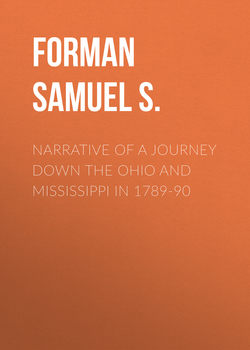Читать книгу Narrative of a Journey Down the Ohio and Mississippi in 1789-90 - Forman Samuel S. - Страница 3
NARRATIVE OF A JOURNEY DOWN THE OHIO AND MISSISSIPPI, 1789-’90
ОглавлениеGENERAL DAVID FORMAN,6 of New Jersey, entered into a negotiation with the Spanish minister, Don Diego de Gardoque, for his brother, Ezekiel Forman, of Philadelphia, to emigrate with his family and sixty odd colored people, and settle in the Natchez country, then under Spanish authority.
I agreed with General Forman to accompany the emigrating party; and, about the last of November, 1789, having closed up my little business at Middletown Point, New Jersey, I set out from the general’s residence, in Freehold, with Captain Benajah Osmun, an old continental captain, who was at that time the faithful overseer of the general’s blacks. There were sixty men, women, and children, and they were the best set of blacks I ever saw together. I knew the most of them, and all were well-behaved, except two rather ill-tempered fellows. General Forman purchased some more, who had intermarried with his own, so as not to separate families. They were all well fed and well clothed.
We had, I believe, four teams of four horses each, and one two-horse wagon, all covered with tow-cloth, while Captain Osmun and I rode on horseback. After the distressing scene of taking leave – for the general’s family and blacks were almost all in tears – we sat out upon our long journey. The first night we camped on the plains near Cranberry, having accomplished only about twelve or fifteen miles. The captain and I had a bed put under one of the wagons; the sides of the wagon had tenter-hooks, and curtains made to hook up to them, with loops to peg the bottom to the ground. The colored people mostly slept in their wagons. In the night a heavy rain fell, when the captain and I fared badly. The ground was level, and the water, unable to run off, gave us a good soaking. I had on a new pair of handsome buckskin small clothes; the rain spoiled their beauty, and the wetting and subsequent shrinkage rendered them very uncomfortable to wear.
The next morning we commenced our journey as early as possible. We drove to Princeton, where we tarried awhile, and all were made comfortable. We crossed the Delaware five miles above Trenton. On arriving at Lancaster, in Pennsylvania, the authorities stopped us, as we somewhat expected they would do. General Forman had furnished me with all the necessary papers relating to the transportation of slaves through New Jersey and Pennsylvania. While Judge Hubley was examining the papers, the servant women informed me that the females of the city came out of their houses and inquired of them whether they could spin, knit, sew, and do housework, and whether they were willing to go to the South; so, if the authorities stopped us, they could all soon have new homes. But our colored women laughed at the Lancaster ladies, who seemed mortified when they learned that we could not be detained.
In Westmoreland county we had a little trouble with a drunken justice of the peace and some free blacks. These free blacks, as we learned from a faithful old colored woman, furnished the two ill-tempered blacks of our party with old swords and pistols, but nothing serious grew out of it.
The weather began to grow very cold, the roads bad, and traveling tedious. We encamped one night in the woods, kindled a fire, and turned the tails of the wagons all inward, thus forming a circle around the fire. Another night we came to a vacant cabin without a floor; we made a large fire, and all who chose took their bedding and slept in the cabin, some remaining in the wagons. The captain and I had our beds spread before the fire.
6
General Forman was born near Englishtown, Monmouth Co., New Jersey. He was, during the Revolutionary war, a terror to the tories of his region, and as brigadier-general commanded the Jersey troops at the battle of Germantown. No less than eighteen of the Forman connection were in his brigade in this engagement. He was subsequently a county judge, and member of the council of state. He died about 1812.
